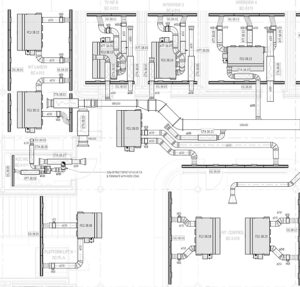
Commissioning Validation: Creating Certainty and Mitigating Risk
 The Role of Building Services Validation in the Built Environment
The Role of Building Services Validation in the Built EnvironmentToday’s ever-changing world is marked by evolving safety standards, increasing tenant demands, intense budget scrutiny, heightened focus on carbon neutrality and energy performance ratings. This is why building services validation has become more important than ever and is especially important when making design decisions around the future of a building’s mechanical and electrical systems.
Accurate building services validation reports provide clients with confidence in their building’s assets including compliance, capacity, efficiency, and safety. These reports highlight potential risks, and opportunities, allowing clients to make informed decisions guaranteeing confidence in their budget and the building’s performance.
Our experienced teams work for a range of clients across multiple sectors including commercial, health, laboratories, pharmaceuticals, education, residential and hospitality. Clients include MEP design consultants, project managers, facilities managers, developers, landlords and tenants. Every job is different, and our knowledge and experience of what needs to be done to validate and de risk projects is what sets Banyards apart.
The Consequences of Ineffective Validation
Without effective validation, building owners and tenants face significant risks.

Building Services Validation Generates Cost Savings
All clients are looking for value for money. Intrusive validation surveys can lead to significant cost savings for tenants and landlords. A full and detailed building services report will help a landlord identify whether upgrading their building is required to make it compliant, energy efficient and ready for market.
From a tenants perspective in a multi-level office block where a tenant occupies three floors, the Agreement for Lease (AFL) may specify heating, cooling, and lighting loads. Pretesting and validating these loads can help prevent future disputes and ensure the tenant receives the agreed-upon services. Additionally, understanding the condition and life expectancy of equipment informs maintenance decisions and prevents costly breakdowns.
A tenant fit out will depend on the design figures agreed with the landlord and these need to actually be verified on site including air and water . Whether the tenant is looking after their own plant or not can also be a factor. If equipment breaks down, who picks up the cost and could this be pre-determined by the validation report?
The Benefits of Validation During Refurbishment
Building Services Validation plays a critical role during building refurbishments, especially when considering the impact on Energy Performance Certificates (EPCs) and plant replacements. Tenants are increasing seeking energy efficient buildings which can lead to a continuous cycle of upgrades. Validation ensures that refurbishments meet energy efficiency standards, thus reducing energy bills and carbon footprints. This is particularly important considering the Minimum Energy Efficiency Standards (MEES) legislation, which mandates phased compliance by 2027 and 2030.
 Challenges in the Evolving World of Building Services
Challenges in the Evolving World of Building Services
The building consultancy industry faces several challenges in terms of legislation, compliance, and data accuracy.
Building services engineers and commissioning verification engineers need to be fully qualified and abreast of the latest standards, codes and guidance.
Precise data collection and analysis is crucial for reliable validation reports. Potential solutions include utilising advanced technology for data monitoring and capture. Overcoming these challenges is essential when providing clients with accurate insights into their building’s performance and compliance.
Insights into the Future of Building Services Validation and Verification
The future of validation in the UK building consultancy sector is promising, driven by evolving regulatory frameworks, compliance, technological advancements, and changing market dynamics. As buildings modernise and adapt to post-COVID demands, the need for validation services increases.
Landlords are focused on making their buildings more energy-efficient and suitable for modern work patterns. Validation and verification ensure capital plant replacements and upgrades meet these new requirements, providing reassurance about performance as well as compliance.
Buildings and their landlords are being forced to address and adapt to the increasing demand for flexible working patterns, more meeting areas, employee gyms, bike storage and other facilities used to attract new employees and those returning to work in the office. Tenants will engage a validation report to de-risk the move from one building to another when seeking these facilities.
Sometimes in a multiple floor building with various tenants, we will validate a building before a bespoke fit-out project and again after it is completed to check the landlord’s building systems have not been affected by the work. This work is essentially checking the agreements for lease have been complied with.
We frequently find ourselves validating before and after capital plant replacements. A typical example might be that we undertake a validation exercise on the reliability and capacity of a chiller and as a result a new chiller may be installed. We then return to ensure it is fully commissioned and delivering the correct volume flowrate, temperatures and performance.
Mastering Energy Performance Certificates (EPC) and ensuring energy efficiency in buildings are crucial starting points for effective validation. Most clients prefer to upgrade their buildings to meet energy standards rather than move to new premises depending on their business model, length of lease and value of the works. This trend has gained urgency with the introduction of the Minimum Energy Efficiency Standards (MEES) legislation.
To navigate these changes, clients need a comprehensive understanding of their buildings, including potential risks and the costs associated with future improvements. Our validation services encompass all essential aspects, such as assessing the condition and life expectancy of the mechanical and electrical (M&E) plant and systems, identifying performance-affecting defects, and conducting load monitoring to understand energy usage. This holistic approach ensures that buildings not only meet regulatory standards but also operate efficiently, reducing energy bills and the carbon footprint.
 Expertise and Experience at Banyards
Expertise and Experience at Banyards
David Cocksedge, Director at Banyards, explains:
“We are unique in our service offering – we cover the full range of services when we validate buildings for our clients. From HVAC systems, electrical systems, BMS systems through to lifts we cover the whole range of building services. What sets Banyards apart is the integration of our Validation team within our larger nationwide teams specialising in Design Consultancy and Commissioning Verification / Management. This integration ensures comprehensive assessments of plant capacity, compliance, and condition, providing clients with the assurance they need when upgrading their existing buildings or transitioning into new buildings.”
 Graham Watt, Commissioning Operations Manager responsible for Validation explains:
Graham Watt, Commissioning Operations Manager responsible for Validation explains:
“The post-COVID workplace transformations have heightened the importance of validation and especially ventilation systems. With new amenities and collaborative workspaces, tenants are increasingly concerned about the efficiency and reliability of building systems. Validation helps tenants and landlords alike by mitigating future risks and ensuring buildings meet the highest standards of safety, efficiency, and performance.”
Demonstrating Technical Ability and Commitment to Sustainability
Banyards’ technical ability is demonstrated and underpinned through our accreditations. We are full members of the Commissioning Specialists Association and some of our team sit on the committees. We are members of the BSRIA and are NICEIC accredited. We also have a track record of repeat business with leading MEP consultancies. Their validation services provide clients with detailed insights into their buildings and inform future designs and plant replacements that could save money and reduce carbon footprints.
Conclusion: The Linchpin of Building Management
Building services validation has become the linchpin in fostering confidence, sustainability, and resilience in building management. Banyards remains at the forefront, delivering bespoke solutions tailored to client needs and ensuring buildings meet the highest standards. Whether it’s safeguarding the interests of landlords and tenants, reducing energy bills, or ensuring compliance with new regulations, validation is essential in today’s complex building environment. Banyards services are nationwide, and we also assist clients to define bespoke scopes of works to meet the specific requirements. That is one of the benefits of our expertise and experience, whether it is Landlords plant replacements or the fit out of a building. Our reports ultimately highlight to our clients on the condition, capacity and life expectancy of their building services systems along with identifying potential risks which results in cost savings.
PLEASE READ THE TERMS OF THIS POLICY CAREFULLY BEFORE USING THE [BANYARDS’ PORTAL]
What’s in these terms?
This acceptable use policy sets out the terms that apply when you access or interact with the Banyards’ Portal.
Who we are and how to contact us
Our site is operated by Banyard Consultants Ltd (“We”). We are a limited company registered in England under company number 3847976. Our registered office is 28-30, Worship Street, London, EC2A 2AH. Our VAT number is GB 826 7615 08.
By using our site you accept these terms
By using our site, you confirm that you accept the terms of this policy and that you agree to comply with them.
If you do not agree to these terms, you must not use our site.
We recommend that you print a copy of these terms for future reference.
There are other terms that may apply to you
Our website Terms and our Privacy Notice also apply to your use of our site.
Portal Content
The Banyards’ Portal allows you to access information reports, data and test results to check and monitor the progress of work undertaken by third party contractors at your site. You may only use the Banyards’ Portal for the purpose of accessing information in relation to Projects administered by us for you.
Access to the Banyards’ Portal
At the commencement of each Project you will be provided with a unique login password to enable you to access the Banyards’ Portal. This will then enable you to review the current status on your various Projects. You are responsible to ensure that the login password will only be given to those of your employees, agents or advisers whom you wish to access information from the Banyards’ Portal.
By accessing the Banyards’ Portal you will be able to review and download copies of information that are posted by us on your Client Portal.
Updating of Information
Information will be regularly updated by us and in any event within 7 days of verification by us of information provided by your contractors.
All information and data uploaded from time to time to your portal will be correct [at the time of upload].
If for any reason, outside our control, we are unable to upload information to the Banyard’s Portal then we will let you know by posting a message on our website and we will take all reasonable steps to minimise any delays in so doing.
If we fail to upload information to Banyards’ Portal in accordance with these terms and such failure arises from any delay on the part of your contractors or the supply by them of inadequate or incorrect information, then we shall have no liability to you arising from such delays or the uploading of incorrect or misleading information provided to us.
We may make changes to the terms of this policy
We amend these terms from time to time. Every time you wish to use our site, please check these terms to ensure you understand the terms that apply at that time.
Breach of this policy
When we consider that a breach of this policy has occurred, we may take such action as we deem appropriate.
Failure to comply with this policy constitutes a material breach of the terms of use upon which you are permitted to use our site, and may result in our taking all or any of the following actions:
We exclude our liability for all action we may take in response to breaches of this acceptable use policy. The actions we may take are not limited to those described above, and we may take any other action we reasonably deem appropriate.
Which country’s laws apply to any disputes?
The terms of this policy, its subject matter and its formation (and any non-contractual disputes or claims) are governed by English law. By using our site you agree to the exclusive jurisdiction of the courts of England and Wales.
Effective Date
These Terms are effective from January 2019